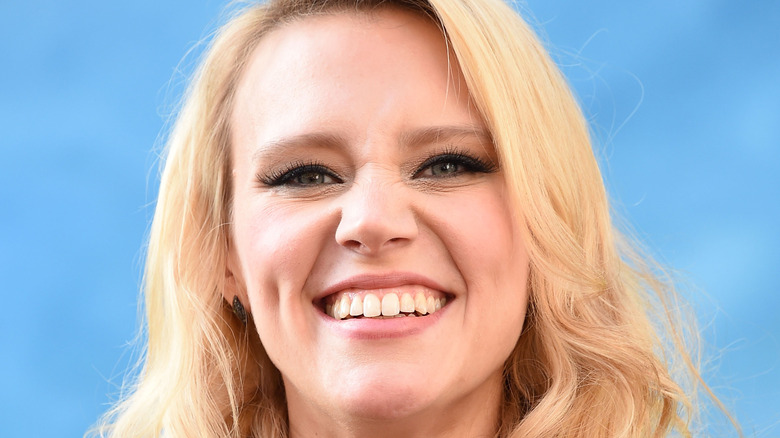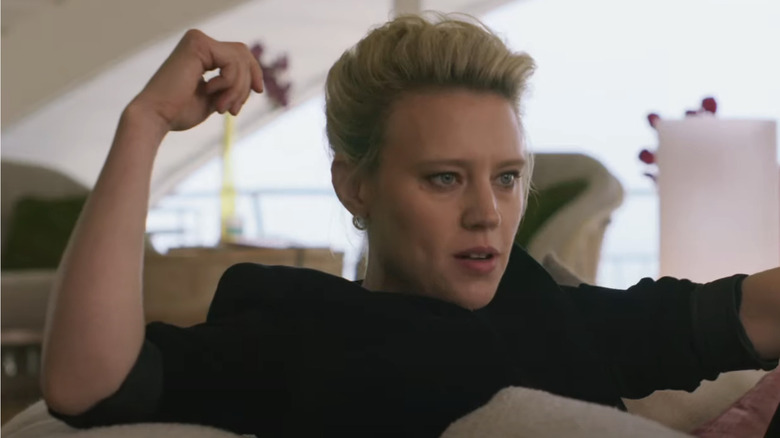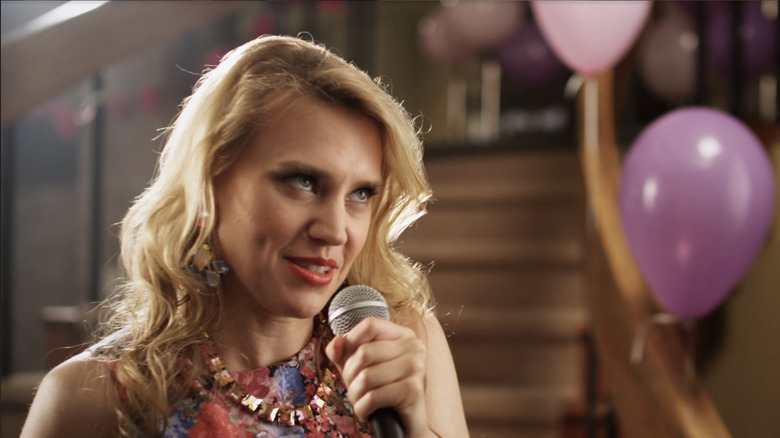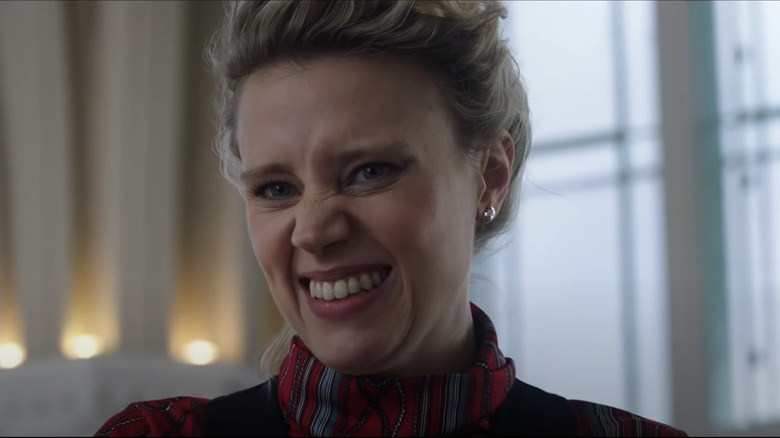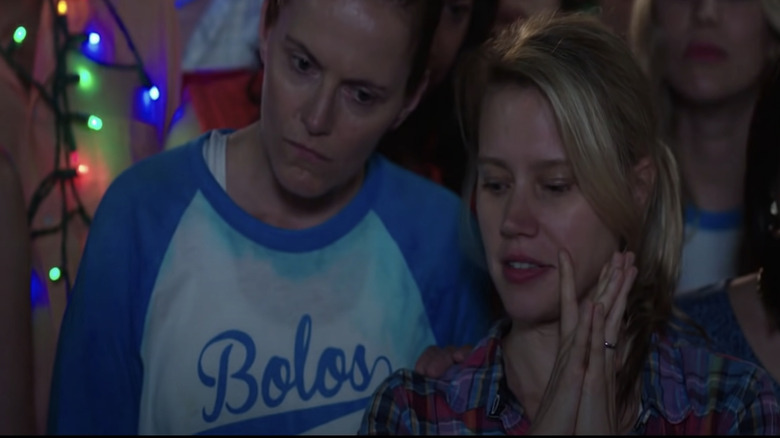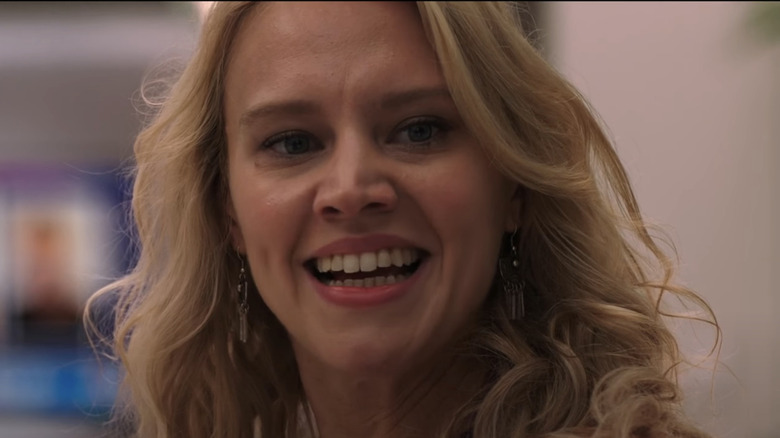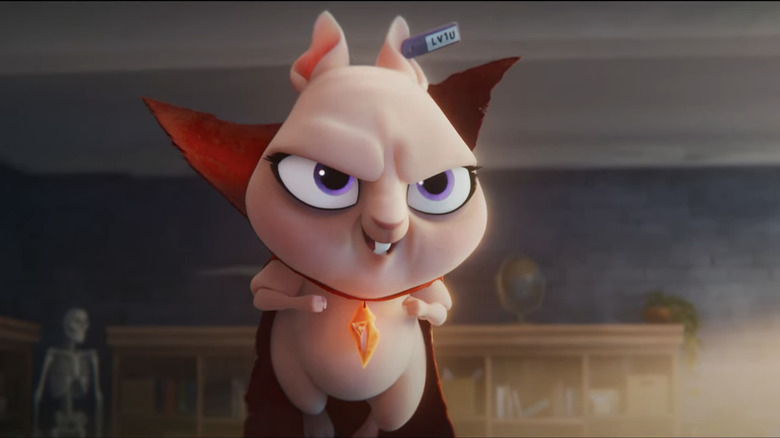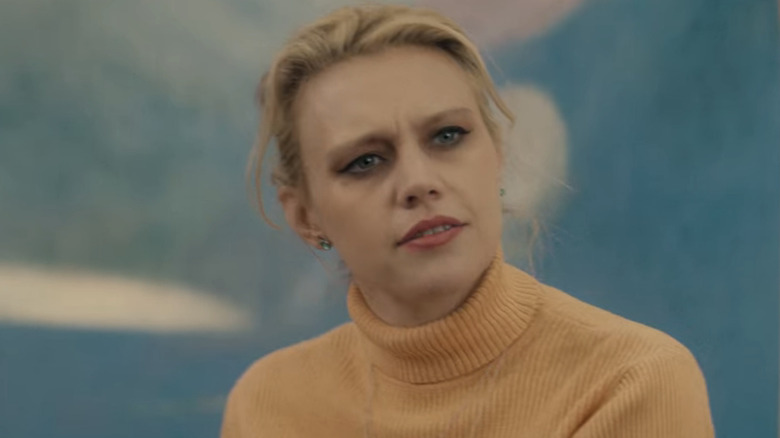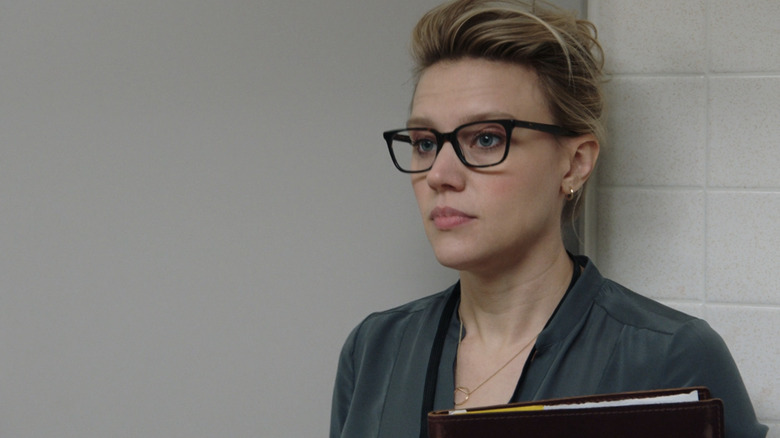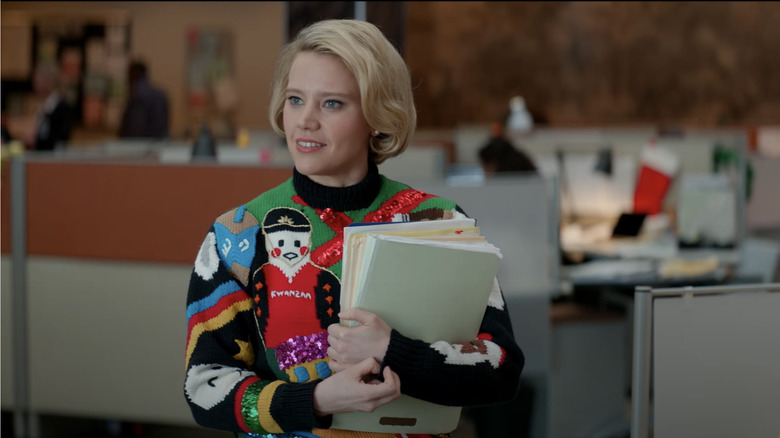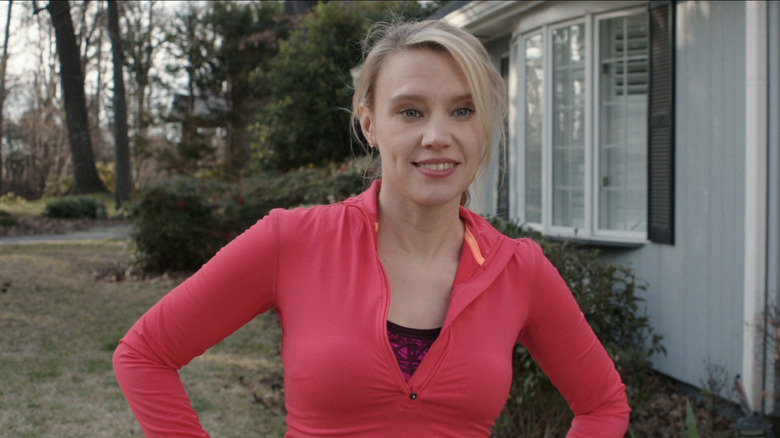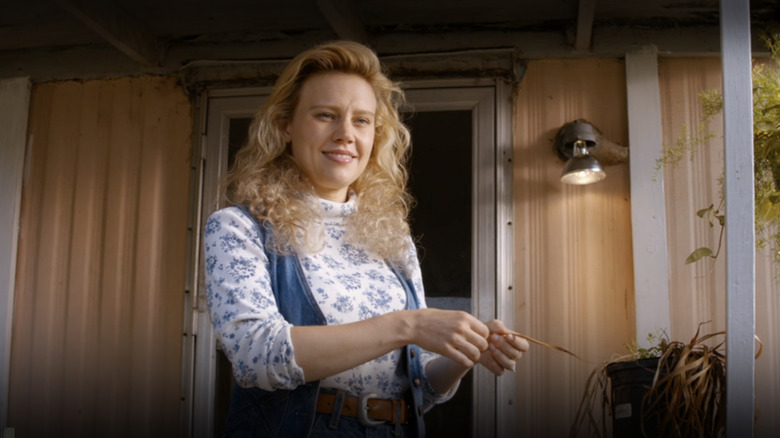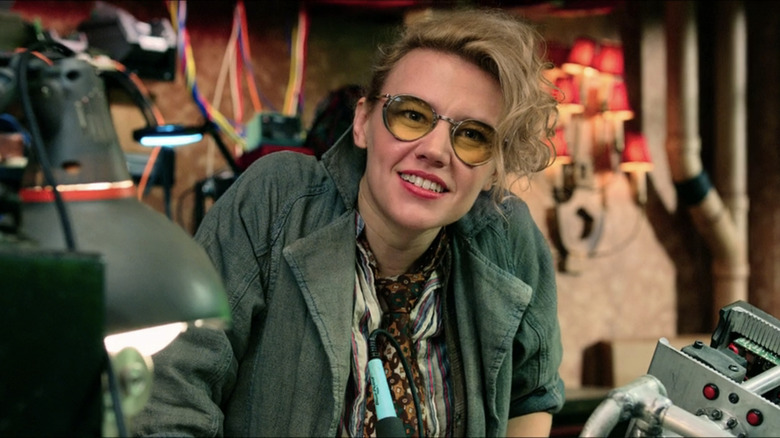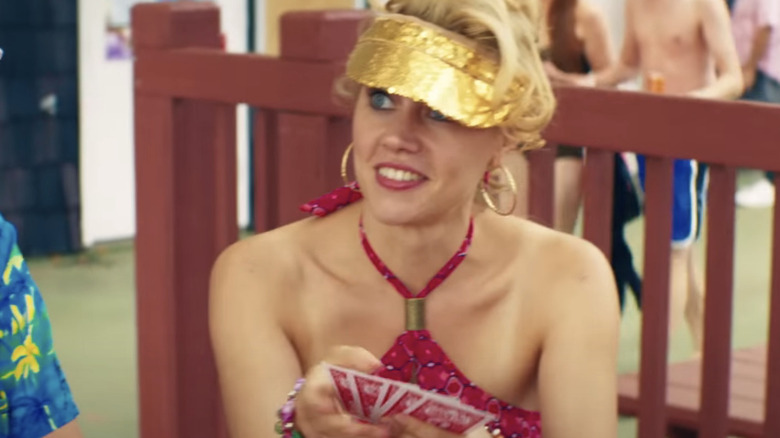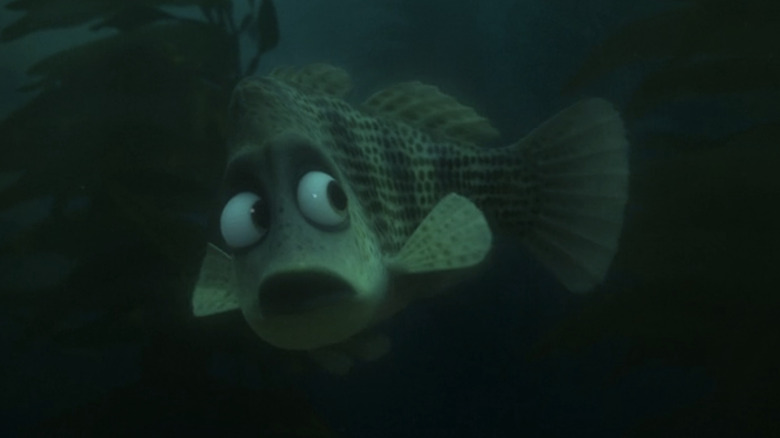The 7 Best And 7 Worst Kate McKinnon Movies Ranked
Actor and comedian Kate McKinnon is best known for her decade as a cast member on "Saturday Night Live." But with over 70 screen credits, she has become so much more.
After cutting her teeth at the Upright Citizens Brigade in New York and on Logo's "The Big Gay Sketch Show," McKinnon joined "SNL" as a featured player in 2012, becoming a household name for her dead-on impressions of Hillary Clinton, Justin Bieber, and many others, as well as her lived-in character work, with original creations like serial alien abductee Colleen Rafferty, or any of the many co-dependent duos she crafted with co-star Aidy Bryant. When McKinnon left the show at the end of the 2021-22 season, she did so as the longest-tenured female cast member in "SNL" history, as well as its first openly gay female cast member.
As with many "SNL" stars before her, Hollywood came calling. While McKinnon has yet to find a lead role that takes advantage of her many talents, she has been an inveterate scene thief, stealing laughs with small supporting roles in everything from barely-released indie flicks to big-budget sequels of universally-beloved films.
McKinnon is often the best part of whatever film she's in, especially when the film itself isn't all that great. With that in mind, here are the seven worst and seven best films in her filmography.
Worst: Yesterday
Directed by Danny Boyle ("Trainspotting") from a script co-written by Richard Curtis ("Love Actually"), 2019's "Yesterday" is a strange beast.
Struggling British songwriter Jack Malik (Hamish Patel) is hit by a bus during an apparent worldwide blackout, and when he awakens in the hospital, he has entered an alternate universe where The Beatles never existed. Jack seizes the opportunity to become rich and famous by passing the Fab Four's catalog off as his own, but at the expense of his soul and relationship with Ellie (Lily James), his manager and the one person who believed in him when he was a nobody.
The film doesn't put much thought into the implications of a pop music landscape that evolved without The Beatles — other than the band Oasis not existing, which is a solid Gen-X burn — and when it does, the results are either maudlin or ghoulish, rewriting history so that Jack can meet one of his idols. Several real-life music stars appear as themselves, most notably Ed Sheeran in a surprisingly large role.
McKinnon appears as Sheeran's manager Debra, who takes an interest in Jack despite her obvious displeasure with how he looks. "You are skinny, yet somehow round," she bluntly notes. As with many of her roles, McKinnon brings the character to life through sheer force of will, juicing every line with a neurotic pause or body movement. Even the way she sits on a couch emphasizes what a bland character Debra must have been on the page.
Best: Intramural (aka Balls Out)
The 2014 college sports comedy "Intramural" (later retitled "Balls Out") presents itself as a parody of 1980s inspirational sports flicks, complete with beachside training montages and opening with a vintage Orion Pictures title card — but in actuality, it's more like a throwback to the bro-centric 2000s comedy of "Dodgeball" and "Old School."
Jack Lacy, fresh from his turn on the final season of "The Office," stars in the Luke Wilson/Vince Vaughn role of Caleb, a beaten-down everyman studying for law school and dealing with his high-strung, oblivious girlfriend (McKinnon). Years ago he quit playing intramural flag football after a crushing defeat, but a chance encounter with an old friend inspires him to lace up for one final season. Can he pull a ragtag team together and defeat his arch rival (McKinnon's "SNL" co-star Beck Bennett)?
McKinnon is saddled with the "shrill girlfriend" role, destined to get dumped as soon as she makes Caleb choose between her or flag football — or more accurately, as soon as Nikki Reed is introduced as flannel-clad cool girl Meredith, who loves flag football and accepts a necklace made of a homeless man's teeth as the ultimate romantic gesture. Rather than be crushed under the weight of such a thankless role, McKinnon breaks through with a wild-eyed, gleefully unhinged interpretation of a long-suffering female stereotype. As is often the case, she appears to be performing in a stranger, better movie than everyone else.
Worst: The Spy Who Dumped Me
Is there such a thing as too much Kate McKinnon? That's the question seemingly posed by 2018's "The Spy Who Dumped Me," an action comedy starring Mila Kunis as Audrey, a woman whose seemingly perfect boyfriend Drew (Justin Theroux) dumps her by text message. Furious and heartbroken, Audrey and her best friend Morgan (McKinnon) set out for an explanation, but soon become entangled in an international conspiracy as it's revealed that Drew was secretly a CIA operative.
The film is a rare starring role for McKinnon, and she is once again effortlessly funny and compulsively watchable, especially when confronted with an intimidating MI6 officer played by Gillian Anderson, or when revealing that her summer camp boyfriend was Edward Snowden. But without a real character in which to ground her humor, McKinnon's constant comic business eventually becomes numbing.
Perhaps the issue here is not that there is too much McKinnon, but not enough of everything else. Director and co-writer Susanna Fogel goes heavy on the action sequences, which are often graphically violent in a way that never quite gels with the comic scenes. Still, McKinnon and Kunis have great chemistry, and the film's endlessly supportive view of female friendship is by far its most successful element.
Best: Sisters
Tina Fey's comedy team-ups often have her playing a buttoned-up type against a more wild, irresponsible partner, from Paul Rudd in "Admission" to Amy Poehler in "Baby Mama," just to name a few. 2015's "Sisters" is a rare break from her typical on-screen persona, with Fey as middle-aged party girl Kate, who convinces her recently-divorced sister (Poehler) to throw one last high school-style rager at their parents' house before it's sold off.
Scripted by "SNL" writer turned "Girls5Eva" star Paula Pell, the cast is stacked with sketch comedy all-stars. Fey and Poehler reunite with 2000s-era "SNL" cast members Maya Rudolph, Rachel Dratch, and Chris Parnell, plus John Lutz and Sue Galloway from "30 Rock," John Leguizamo, Samantha Bee, and John Cena as a drug dealer named Pazuzu. McKinnon has a small role, representing the new generation of "SNL" stars here alongside Bobby Moynihan, notable mostly for being one of the few explicitly gay characters she has played on film.
As the party goes disastrously awry and Kate and Maura's personal conflicts have devolved into a fight in the mud, McKinnon's Sam leans over to her partner (Colleen Werthmann) and deadpans, "This reminds me of the movie we watched on our anniversary."
Worst: Rough Night
The 2017 dark comedy "Rough Night" attempts a distaff version of the "bachelor party gone wrong" subgenre, taking a page from not just the "Hangover" series but also "After Hours," "Weekend at Bernie's" and 1998's "Very Bad Things." Scarlett Johansson stars as Jess, a straight-laced senate candidate whose bachelorette party in Miami takes a severe turn when the male stripper her best friend (Jillian Bell) ordered off Craigslist ends up dead. The party's attempts to cover up his death leads to a (rough) night full of jet ski accidents, swingers, jewel thieves, and personal growth.
There are a lot of things going on in "Rough Night," and like "The Spy who Dumped Me," the film has a hard time balancing its various tones from one scene to the next. Johannson is surrounded by funny women, including Bell, Zoe Kravitz, and Ilana Glazer, but they're given relatively little to do but comment in disbelief about whatever wild thing has just occurred. It's McKinnon who once again walks away with the bulk of the laughs as Pippa, the friend from Australia whose accent grows increasingly ridiculous — and who helpfully sings a song summarizing the film over its end credits.
Best: DC League of Super-Pets
The DCEU received an animated makeover in the 2022 hit "DC League of Super-Pets," with McKinnon voicing the baddie.
When a stray piece of orange Kryptonite gives the residents of a Metropolis animal shelter unexpected super powers, Krypto the Super-Dog (Dwayne Johnson) must whip these pound puppies (and pigs and squirrels) into shape to rescue Superman (John Krasinski) and the rest of the Justice League, who have been taken hostage by a deranged guinea pig (McKinnon) bent on world domination.
The film fits right in with DC's recent animated films like "The LEGO Batman Movie" and "Teen Titans GO! to the Movies," but with a greater ratio of heart to laughs. It also has the opportunity to delve deeper into its source material's lore than most live action superhero films; Krypto and Ace the Bat-Hound (Kevin Hart) have been around for decades, and the kaleidoscope of non-green Kryptonites have been bedeviling Superman for just as long, but all of them are receiving their big screen debut here. Johnson and Hart are backed up by an all-star voice cast including Vanessa Bayer and Natasha Lyonne as Krypto's new teammates, Jameela Jamil as Wonder Woman, and Keanu Reeves as Batman. McKinnon makes a meal out of every line as Lulu the Guinea Pig, a former test subject of Lex Luthor (Marc Maron) who seeks to out-evil her old master, giving her vowels a glamorous, Old Hollywood lilt.
Worst: Irreplaceable You
McKinnon's wild-eyed intensity is put to mostly dramatic work in the maudlin Netflix cancer romance "Irreplaceable You."
Apparently inspired by a 2017 New York Times op-ed, the film stars Gugu Mbatha-Raw and Michael Huisman as Abbie and Sam, a pair of seemingly perfect New York yuppies who have been in love since they were eight years old. They've apparently never had a disagreement before, but that unlikely harmony is shattered when Abbie receives a terminal cancer diagnosis. Inspired (or perhaps troubled) by an offhand comment in her support group that Sam is going to go through a big "slut phase" when she dies, Abbie decides to head that off at the pass by finding the perfect woman for him so that he won't have to.
The support group is as unlikely as Abbie and Sam's twee relationship, calibrated for maximum theatricality and scenery-chewing, led by Steve Coogan and including Christopher Walken, Zach Cherry ("Severance"), and actor/writer Tami Sagher. McKinnon adds a frantic energy as Glass Half Full Kate, whose constant positivity annoys the other members of the group until she delivers a blistering monologue (and theme song) about how difficult it is to keep up an upbeat spirit in the face of certain death. It's an affecting moment thanks to McKinnon's abilities as an actor, but ultimately as artificial as Abbie and Sam's tastefully appointed Manhattan loft.
Best: Bombshell
Jay Roach brings yet another political docudrama to life in 2019's "Bombshell," a star-studded account of the turmoil that engulfed Fox News during the 2016 presidential election amid "Fox and Friends" anchor Gretchen Carlson's (Nicole Kidman) sexual harassment lawsuit against Roger Ailes (John Lithgow).
Through the eyes of Kayla, a fictionalized young producer played by Margot Robbie, the audience gets a fast-paced tour of not just the Fox News offices but the Fox News mentality, the particular blend of outrage and titillation that drives a good story, according to producer Jess Carr (McKinnon). Carr, another fictionalized character, is in the closet at work, not just as a lesbian but as a Democrat, and when Kayla is harassed by Ailes, the only thing she can do is look the other way.
Roach manages a tricky balancing act, dramatizing the culture of harassment faced by Kayla, Gretchen, and Megyn Kelly (an uncanny Charlize Theron) and connecting it to the political success of Donald Trump. Kayla begins the film as a Fox News true believer who has just landed her dream job, and finds it far more scandalizing that Jess is a liberal than that she is gay.
While Carlson's lawsuit happened in early 2016, before the #MeToo movement sprang up in earnest, the film was made in the thick of a national reckoning on not just powerful, abusive men but the systems of silence and retaliation that keep them in power. The saga of Kayla and Jess is a vivid illustration of those systems at work.
Worst: Office Christmas Party
Many of the films listed "Worst" here have used McKinnon's innate comic gifts as a crutch on which to lean a lackluster screenplay character, trusting that whenever the camera is pointed at her, something funny will inevitably happen. It's a rare film that doesn't trust McKinnon to be funny, or doesn't seem to have cast her to be funny at all.
2016's "Office Christmas Party" is that film, a haphazard collection of familiar comic faces left to improvise endlessly between slapstick setpieces. The plot, such as is, involves the owner of a Chicago tech firm (T.J. Miller) throwing a drug-and-booze fueled Christmas party in the hopes that it will impress a potential client (Courtney B. Vance), much to the horror of his cold-hearted sister (Jennifer Aniston) and the company HR director Mary (McKinnon), whose only mission is to be a stick in the mud at every turn.
Meanwhile, everyman Jason Bateman nurses a crush on fellow techie Olivia Munn while the two rescue Miller from his own impulses and some local gangsters. The joke-to-dud ratio is disappointingly imbalanced for such a talented cast, which also includes Rob Corddry, Sam Richardson, Vanessa Bayer, and Randall Park. What's perhaps most impressive about the film is that it received a theatrical release at all; if it had been made just two years later, it likely would have gone straight to Netflix.
Best: Family
The deadpan 2018 comedy "Family" begins where it ends, with a woman (Taylor Schilling) in the throes of an Insane Clown Posse show in full Juggalo makeup.
Kate (Schilling) is a heartless urban workaholic taught what really matters in life by being forced to spend a week in the New Jersey suburbs watching over her niece Maddie (Bryn Vale). It's the kind of story that has fueled films from "Uncle Buck" to "Jersey Girl," but writer-director Laura Steinel's script doesn't play at such a cuddly level. For one thing, Maddie is a middle school outcast who falls in with a group of teenage Juggalos, and the film doesn't pretend that any of her interests, like karate or wearing capes, will make her life any easier. Likewise, Kate is abrasive and friendless from the beginning, and up until a slightly unearned ending, it feels like her time with Maddie hasn't taught her a thing.
McKinnon appears in a handful of scenes as Jill, the brittle suburban neighbor who immediately rubs Kate the wrong way. First they clash politely over Kate's garage door being left open, then about Kate's speeding, then about Maddie monopolizing the bounce house at Jill's kid's birthday, which bursts into open hostility between the two. McKinnon is perfectly in tune with the film's just-slightly-twee sensibility, suggesting a woman who knows how to play the role of a suburban mom but is a little too strange to quite sell the performance.
Worst: Masterminds
If "Family" was just slightly twee, the 2016 comedy "Masterminds" is offensively so. Director Jared Hess ("Napoleon Dynamite") uses the true story of a 1997 bank robbery as an excuse to drape his stars in the tackiest mullet wigs and track suits he can find. Zach Galifianakis stars as David, a security guard seduced by fellow guard Kelly (Kristen Wiig) into plotting and carrying out a $17 million robbery with the help of local loser Steve Chambers (Owen Wilson). When David heads down to Mexico to hide out after the robbery, Steve double crosses him and hires a hitman (Jason Sudeikis) to take him out.
The real story would be plenty wild, without the filmmaker's constant need to turn every one of his characters into a country fried cartoon. Case in point, the name of David's wife (McKinnon) was changed from Tammy to Jandice, presumably because it makes her character sound stupid. McKinnon plays Jandice as if she were recently lobotomized, speaking in an inane drone, only really coming to life in her one scene with Wiig. No one else in the film fares much better; nearly everyone seems content to let their wigs do the acting for them. Famously, the film sat on a shelf for a year when studio Relativity Media went into bankruptcy.
Best: Ghostbusters
In a 2008 episode of "It's Always Sunny in Philadelphia" Mac describes the gang's group dynamic as "the brains, the looks, and the wildcard," using the Ghostbusters as an example of the dynamic in action. But while there really wasn't a wildcard in the lineup of the 1984 Ghostbusters, there absolutely is one in Paul Feig's 2016 reboot: Kate McKinnon's torch-wielding engineer Jillian Holtzmann, who joins parapsychologists Erin Gilbert (Kristen Wiig) and Abby Yates (Melissa McCarthy), as well as amateur subway historian Patty Tolan (Leslie Jones), to rid Manhattan of spooks, specters, and ghosts.
At this point, the deeply unpleasant wave of internet outrage that greeted the film and its all-female team has overshadowed the film itself, and the release of a more conventional legacy sequel in 2022 has memory-holed it even further. But there is much to recommend even beyond McKinnon's hilarious, off-kilter performance, from Chris Hemsworth's comic turn as the team's dim-witted receptionist to the way the film anticipates its own controversy by making its main villain (Neil Casey) a misogynist internet troll.
The film plays with the imagery of the original movie without bowing down before it; the packs and traps and car all look slightly different, just as nearly all the original cast make cameos, but not as their characters. The toys are the same, just with slightly different parts.
Worst: Staten Island Summer
A film that seems to combine all the worst qualities of the other movies on this list, "Staten Island Summer" wastes nearly everyone in its cast, counting on them to make something out of endless improvised scenes with little to no shape, and mistaking its everyday sexism for ironic throwback sexism. What's even more baffling is that the film clearly comes from a genuine place; written by "SNL" head writer Colin Jost, it tells the story of Staten Island lifeguard Danny's (Graham Phillips) last summer on the job before he goes off to Harvard — details mirroring Jost's own journey as a Staten Island native who went to Harvard. Before Danny sets off, though, he is determined to have one last blow-out pool party on Labor Day weekend.
Jost must have called in a host of favors (or cornered people at work), as the cast is packed to the gills with "SNL" cast members. Cecily Strong has the biggest role, as a tough-but-sweet lifeguard who gets caught in a love triangle with a cougar played by Gina Gershon, but everyone from Fred Armisen to Bobby Moynihan to Mike O'Brien has at least a scene or two to play. McKinnon's role as a second generation pool lady barely figures into anything; she's not so much wasted here as non-existent.
Best: Finding Dory
McKinnon's role in the Pixar sequel "Finding Dory" is relatively small, but typical of the "Finding" films' adventure structure, where new characters enter and leave with nearly every scene.
The film starts with a prologue featuring young Dory (Sloane Murray), already a forgetful fish, who soon gets separated from her parents with no memory of how to get home. A pair of bickering married fish played by McKinnon and "SNL" castmate/Pixar alum Bill Hader are the first strangers who try to help Dory, and the first to get flustered by her short term memory loss. They turn around for a moment, but the little fish is gone.
That's the last we see of Husband Fish and Wife Fish (as they are listed in the credits), but that spirit of helpfulness informs Dory's (voiced as an adult by Ellen DeGeneres) character in both this film and its predecessor, 2003's "Finding Nemo." Dory asks for help often, and is as helpful as she can be in return, a quality that makes her special in the often inhospitable deep. This sequel follows many of the same beats as the original film, as Dory's search for her parents takes her, Marlon (Albert Brooks), and Nemo (Hayden Rolence) to a marine research facility in California, but when those beats are so sturdy and the visuals are so stunning, a little repetition is welcomed.
